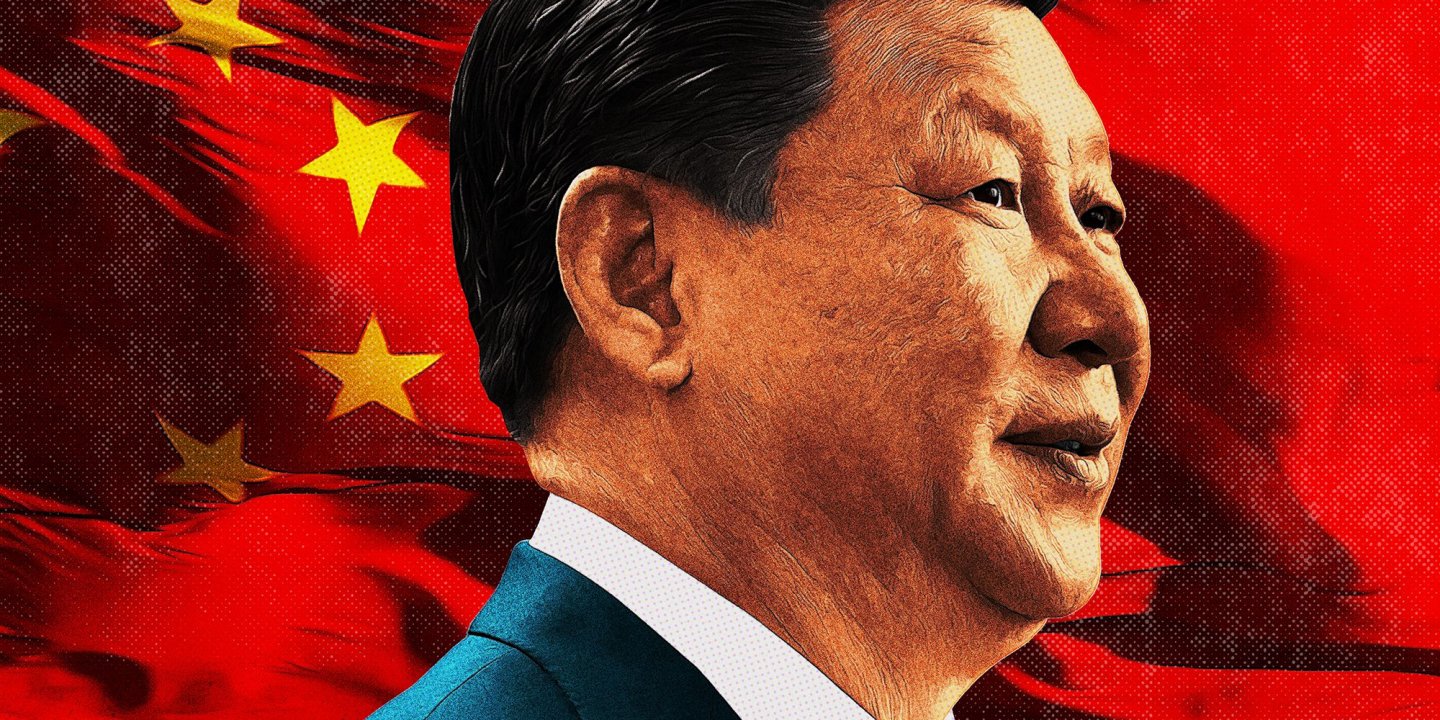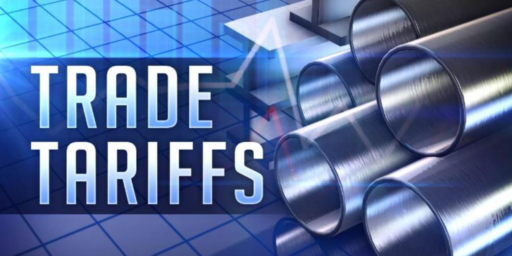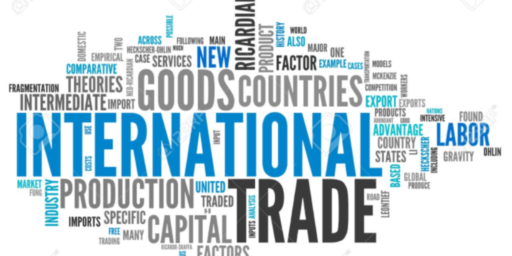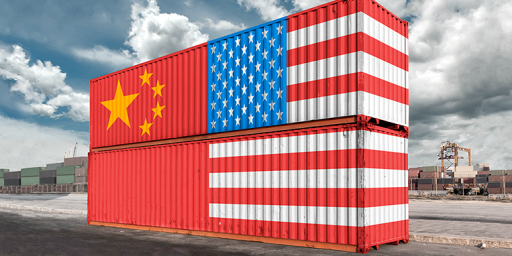China’s Gray Zone Activities
It's more than competition but less than war.

Two related articles from earlier in the week.
Michael Schuman, The Atlantic (“China Has Gotten the Trade War It Deserves“):
A global trade war is starting, and China is at the center of it. A reckoning for Beijing’s economic model, which is designed to promote Chinese industry at the expense of the rest of the world, has long been coming. China’s trading partners have had enough. The result will be a wave of protectionism, with potentially dire consequences for both China and the global economy.
The most obvious and dramatic evidence for this was unveiled [Tuesday] by President Joe Biden, who announced that his administration would quadruple the existing tariffs on imported Chinese electric vehicles, to 100 percent. He will also hike tariffs on steel, aluminum, medical equipment, semiconductors, solar cells, and lithium batteries. The Chinese government instantly protested and threatened action of its own. “The United States should immediately correct its wrong practices,” the Chinese Ministry of Commerce said in a statement. “China will take resolute measures to defend its own rights and interests.”
et China’s leaders have no one to blame but themselves. They joined a global trading system and then gamed that system. Biden’s tariffs are the natural response, though not an entirely positive one. Protectionism raises costs, hurts consumers, shields unworthy companies from competition, and punishes worthier ones. Disputes over trade will only intensify the rivalry between the world’s two great powers.
This souring of trade relations wasn’t always foreordained—but it had become virtually unavoidable. Chinese leader Xi Jinping has failed to reform his economy in ways that would have made this trade war less likely. Facing this confrontation with the United States, he is even less likely to make reforms today. The result is trade conflict and heightened political tensions that benefit no one.
[…]
All governments place their thumb on the scale to promote their national industries to some degree. China’s thumb simply weighs more heavily. A 2022 study by the Center for Strategic and International Studies in Washington conservatively estimated that China spent $248 billion supporting its industries in 2019. That’s twice as much as the United States did.
“It’s the whole financial system, the whole economic system that is leveraged for industrial policy, which is very different than what’s been happening in market economies,” Camille Boullenois, an analyst of Chinese industry at the research firm Rhodium Group, told me. Where electric vehicles are concerned, “it’s very hard to imagine the industry growing as fast without government support.”
[…]
Xi Jinping seems set on making matters worse. His principal economic goal of achieving “self-sufficiency” aims to reduce what China purchases from other countries and substitute goods made by foreign companies with Chinese alternatives—especially in industries, such as green energy, that other governments find strategic. In doing so, Xi is practically inviting more intense trade disputes.
In Xi’s thinking, economic growth “is going to come from churning out a lot of this stuff and exporting it to the world,” Leland Miller, a co-founder of the research firm China Beige Book, told me. “Why they think they can get away with that when they are already running giant, politically charged trade surpluses with most of the world, including the United States, and they’re going to supercharge those surpluses and think that’s going to be successful … it doesn’t make much sense.”
The big point is that China is not just exporting too much stuff; it’s also exporting its economic problems. Xi intends to maintain Chinese jobs and factories at the expense of other countries’ workers and companies, to avoid necessary but potentially disruptive reform at home. That means Xi is actually undermining the great hope of China’s rise. A wealthier China was supposed to be an engine of global prosperity. Xi’s version is promoting protectionism and confrontation that threaten that prosperity.
Facing political pressure at home, politicians around the world are forced to defend their economies from Xi’s strategy, even if that leads to trade wars that sour relations with Beijing. This is not a good outcome for the global economy or for geopolitical stability. But Xi’s policies have made it inevitable.
The Economist (“Xi Jinping is subtler than Vladimir Putin—yet equally disruptive“):
Mr Xi’s challenge to the world is more subtle than that posed by the warmongering Mr Putin. Yet it is still a problem. He craves a might-makes-right order, letting China do as it pleases. Its support for pariah states is meant to defy and divide the West, while avoiding a direct clash. Its “grey-zone coercion” in the South China Sea falls short of war, but is intended to weaken foes. China thinks these tactics can be sustained without tipping into conflict. The question for any country that supports global rules is how far to let Mr Xi go.
When it comes to Russia, China’s leader has already gone quite far. Mr Xi ignores Western pleas that he tone down his support for Mr Putin, viewing Russia as an indispensable partner in his campaign to dismantle the American-led order. The two countries have been deepening their military and trade ties. America, in turn, has been tightening sanctions, and imposing tariffs on China in other areas. Of most concern are Chinese components and machinery flowing to Russian arms manufacturers. Antony Blinken, America’s top diplomat, has said that Russia would struggle to carry on in Ukraine without China’s support. China is not a participant in the crisis, nor a party to it, bristles Mr Xi. But a long war that tests Western unity is to his advantage.
On the other side of the world, it is the risk of a conflict caused by China that worries America and its allies. The South China Sea is larger than the Mediterranean, but increasingly difficult to cross without encountering Chinese coastguard vessels doing dangerous things. Near two disputed shoals, Chinese guardsmen routinely blast Philippine vessels with water-cannons powerful enough to bend metal. Farther south, Chinese vessels harass Malaysian ships looking for oil and gas in Malaysia’s exclusive economic zone, waters that China calls its own.
The Philippines’ defence treaty with America turns Chinese bullying into a superpower stand-off. The stakes are as high over Taiwan, which is preparing to swear in Lai Ching-te as its new president on May 20th. China increasingly acts as if the island’s air and maritime boundaries do not exist. America and its allies have been preparing for the worst-case scenario: a Chinese invasion of Taiwan. But for now the bigger danger lies in the grey zone, where Chinese actions risk causing a spiral of escalation.
By design, China’s actions in Europe, Asia and elsewhere often lie between war and peace. A forceful response risks seeming like an over-reaction. Doing nothing, though, means ceding incremental gains to China. So the first task is for Western countries to expose China’s actions for what they are: a glimpse of the world order that Chinese leaders seek, in which no country cares, or dares, to challenge their power. Shining daylight on China helps avoid complacency. (Before the invasion of Ukraine, European states took too long to believe American warnings about Russia’s malign intentions.) And information can shift public opinion. Polls in some countries that are a target of China’s bullying suggest growing distrust.
That all makes a second task easier. America must stand by its allies, not as an act of charity, but because they are a superpower asset that China lacks. Relentless Chinese and Russian attempts to divide alliances, from nato to America’s defence network in Asia, are a backhanded compliment. Autocrats respect strength, and there is strength in numbers.
There are powerful incentives in the national security space to exaggerate threats, and China is no exception. This is not Cold War II. While China is, like the USSR before it, an autocratic state with a large nuclear stockpile, there is no talk among rational players about “mutually assured destruction.” Indeed, the notion that conflict between the two great powers could escalate to a thermonuclear exchange is scarcely mentioned. Our countries’ economies are, despite gradually escalating tensions and talk of trade wars, considerably more intertwined than the US and Soviet economies were even at the height of detente.
But make no mistake—China is not a mere peer competitor seeking to enhance its position at our expense within the established norms of the international system. Its activities in both the economic and military spheres are well outside the boundaries of international law yet calculated to remain below the threshold that will lead to a dramatic response.
The Trump and Biden administrations, in different ways, have finally given up on the old elite consensus that treating China as a normal actor would encourage it to become one. We’re rightly ratcheting up pressure but yet stopping well short of a Cold War-style containment strategy. Left to their own devices, though, they would soon establish regional suzerainty over American allies, including Taiwan, Japan, and the Philippines.





Two can play the gray zone game. We should haul some old transport ship out of mothballs, tow it to the South China Sea, transfer ownership to the Philippines, then ground it alongside the Sierra Madre. (The grounded Filipino ship.) Have a small number of US sailors stay aboard as advisers. Then see what Mr. Xi wants to do about that.
Longer term, to paraphrase Chief Brody, “We’re gonna need more boats.” As long as we dominate the seas, we have our boot on China’s neck.
When I read things like this, I always wonder if China realizes how insulting this comes across to American ear and is intentionally being provocative, or if they’re just that bad at translating things into English.
In cold war days the Chinese plan worked for Japan, SKorea and others. Japanese agency MOSI directed them into higher & higher skilled/priced industries. Practically drove German optics and American radios/TVS to extinction.
Two issues keep China from following that path. They’re too darn big & cold war’s over. Road closed.
They’re left to avoid the ‘middle income trap’ on their own.